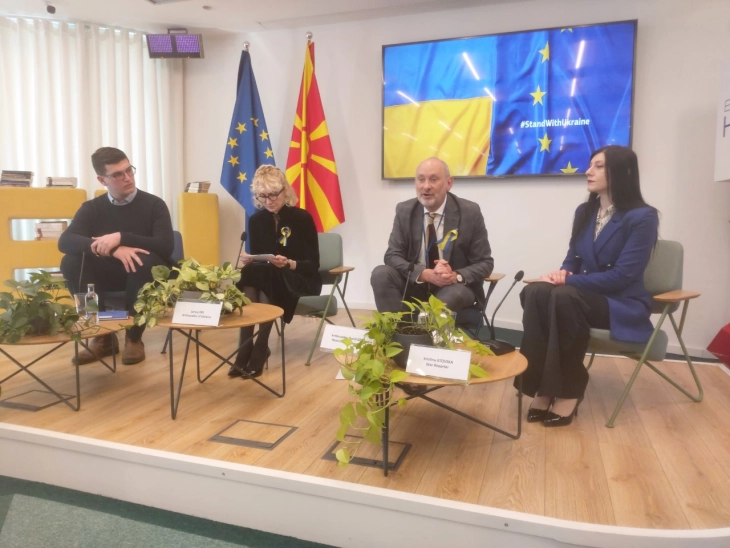Panel: Russian aggression against Ukraine jeopardizes youth’s access to education
- Panel discussion titled "Integration of refugee pupils and students in the education system: presenting Resolution to express solidarity and seek action in regard to the Russian war in Ukraine" organized by Europe House in Skopje, one year after Russia started its invasion on Ukraine, focused on the war from a different aspect – access to education.

Skopje, 24 February 2023 (MIA) – Panel discussion titled "Integration of refugee pupils and students in the education system: presenting Resolution to express solidarity and seek action in regard to the Russian war in Ukraine" organized by Europe House in Skopje, one year after Russia started its invasion on Ukraine, focused on the war from a different aspect – access to education. Participants noted that the aggression has caused some complex problems in the education system in Ukraine, primarily for displaced children who were forced to cut their education short, as well as the damage caused by the destruction of the infrastructure of schools, kindergartens and universities.
EU Ambassador David Geer said Russian missiles have damaged over 2,700 schools in Ukraine and levelled over 100 educational institutions, leaving two million Ukrainian students without the possibility to properly end their education.
“The Solidarity Resolution is dedicated to the strife of young Ukrainians and the way the war affected their security, their income, their wellbeing, and their right to education – a guarantee in the Universal Declaration of Human Rights,” Geer said.
Ukrainian Ambassador Larysa Dir said North Macedonia’s OSCE Chairmanship will focus on the situation in Ukraine, especially in the context of guaranteeing the people’s safety, in an era of global and regional instability.
“The Russian army destroyed 3,126 educational institutions, levelling 338, killing 461 children, wounding 923, 368 are missing and over 16,000 were illegally deported to Russia. The aggression has caused some complex problems in the education system in Ukraine, primarily for displaced children who were forced to cut their education short, and the destruction of the infrastructure of educational institutions is incalculable,” said Ambassador Dir, pointing out that the education process has survived somehow during conditions of war by going remote.

She added that bomb shelters must be a part of all schools and universities in Ukraine, which have to be stocked with the necessary equipment should there be a missile strike. Classes are held in these shelters in such conditions, and the universities in dangerous areas of Ukraine are moved to parts where no such attacks occur. The Science for Ukraine project has provided support for the Ukrainian students and scientists, backing all programs of the national program through the Institute for Human Sciences in Vienna.
North Macedonia has provided temporary shelter and protection for over 300 Ukrainians who were forced to leave their homeland, and they are now learning in Macedonian schools and in Macedonian language, the Ambassador said.
“In this context, they need support to overcome these challenges, not just from their families, but from a friendly environment as well,” Dir concluded.
The "Erase the Nation" documentary was screened before the start of the panel discussion, courtesy of the Polish Embassy in North Macedonia, which depicted the horrors of the war in Ukraine which affected ordinary people the most.







